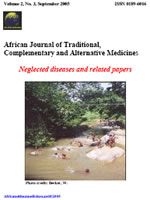
|
African Journal of Traditional, Complementary and Alternative Medicines
African Ethnomedicines Network
ISSN: 0189-6016
Vol. 12, No. 3, 2015, pp. 9-26
|
 Bioline Code: tc15044
Bioline Code: tc15044
Full paper language: English
Document type: Research Article
Document available free of charge
|
|
|
African Journal of Traditional, Complementary and Alternative Medicines, Vol. 12, No. 3, 2015, pp. 9-26
| en |
MEDICINAL PLANT USE OF VILLAGERS IN THE MOPANI DISTRICT, LIMPOPO PROVINCE, SOUTH AFRICA
Chauke, M.A.; Shai, L.J.; Mogale, M.A.; Tshisikhawe, M.P. & Mokgotho, M.P.
Abstract
Background: An ethno-medical survey of plants was conducted at Mashishimale village near Phalaborwa, in Limpopo Province (South Africa).
Owing to high level of poverty and lack of proper daily operational healthcare facilities in certain parts of Mashishimale village, the use of plants
as medicine persists. The aim of the study was to compile a list of medicinal plants used by traditional health practitioners for treatment of
diabetes mellitus and other ailments.
Materials and methods: Traditional health practitioners were identified using the snowballing sampling technique. Structured interviews were
conducted and a list of medicinal plants compiled. Data collection included local names of the plants, the plant parts used in the traditional
medicine, the disease treated by the plant-based remedies and the method of preparation of the medicines.
Results and discussion: A total of 49 plants species belonging to 20 different families we identified. Plant parts used in preparation of remedies
by practitioners are roots (51%), stem barks (30%) and leaves (19%). The most preferred methods of administration were boiling (74%) and
infusion (12%). About 14 plants species were indicated for treatment of diabetes mellitus, while most plant species were indicated for sexually
transmitted diseases, fertility and erectile dysfunction.
Conclusion: The results of the survey indicate that plants play a significant role in primary healthcare of the community of Mashishimale Village.
It would seem that a number of major diseases/ailments are treated by traditional methods. Scientific investigation is therefore needed to isolate
active compounds and to determine safe dosages for treatment. These studies may guide the regulation of herbal medicine industry in South
Africa.
Keywords
Ethnobotanical; Medicinal plants; Mashishimale village
|
| |
© Copyright 2015 - African Journal of Traditional, Complementary and Alternative Medicines
Alternative site location: http://journals.sfu.ca/africanem/index.php/ajtcam
|
|
